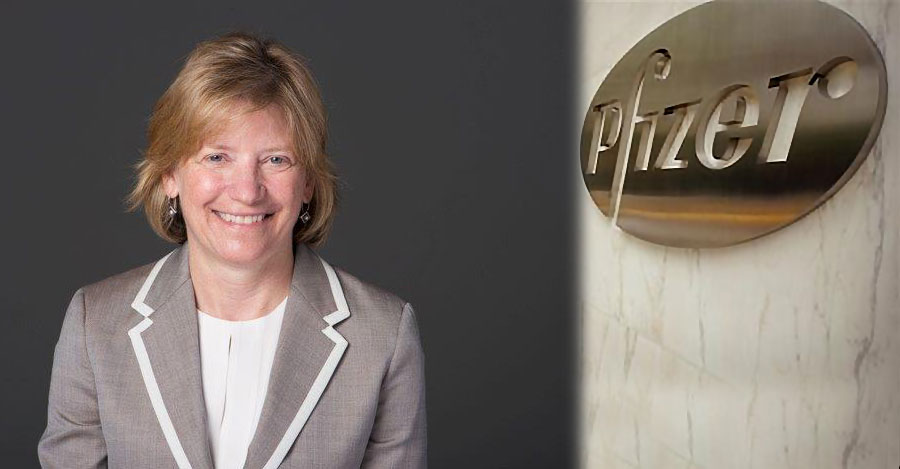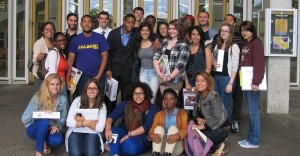
The pharmaceutical industry is a giant in today’s world, bringing in nearly one trillion dollars in worldwide revenue. We all know people who are reliant on pills and medicines to maintain a healthy lifestyle in some way. In order to deliver these medicines to the people, pharmaceutical companies need to spend lots of time and money researching, developing, testing, and bringing product to market.
One of the people in a key leadership position at a pharmaceutical giant today is SUNY’s own Laurie Olson. Laurie attended Stony Brook University, where she received a bachelor’s degree in economics before moving on to Hofstra University for an MBA in marketing. Today, she is executive vice president of Strategy, Portfolio and Commercial Operations at Pfizer. She is responsible for multiple units that shape Pfizer’s long-term strategy, evaluate business development opportunities, drive innovation and digital strategy, deliver business analytics and insights and support commercial operations across the company. She is a member of Pfizer’s Executive Leadership Team and the Portfolio Strategy Investment Committee, which oversees research and development investment and advancement decisions.
Joining Pfizer in 1987 as a market research analyst, Laurie has since held leadership roles in analytics, marketing, commercial development, strategy and operations. In addition to her daily responsibilities, she is the executive sponsor of Pfizer’s global Lesbian, Gay, Bisexual, and Transgender Colleague Group and serves on the company’s worldwide Diversity Leadership Council.
We were lucky enough to have a conversation with Laurie in which she opened up about her undergraduate experience, leadership philosophy, and how she found her niche in the corporate world.
1. Why did you choose Stony Brook, and how did your education prepare you for a successful career at Pfizer?
Growing up in a small town on Long Island, SUNY always had a good reputation with my family. I have three older brothers, all of whom attended SUNY and were very positive about their experience. Affordability was also an issue, as my parents had to put four kids through college. I knew I’d get a quality education at Stony Brook, and I didn’t even apply anywhere else.
Being a student at a large state school gave me access to many resources and offered a variety of ways for me to follow my curiosity. I think my time there made me more well-rounded and open to new experiences, which has served me well throughout my career.
2. What was your major, and was there a memorable lecture, professor, or moment from your SUNY experience that stuck with you and helped shape your future?
My major was economics. I didn’t declare a major right away, however. It wasn’t until I took Economics 101 with Professor William Dawes that I changed my mind. I was intrigued by the idea that there were economic forces that were not up for debate –they were just truths. The forces that governed business decisions were a mystery to me at the time, and Professor Dawes’ class lifted that veil for me.
That said, I think that the most valuable knowledge often comes from unexpected places, and you may not even recognize it as such until years later. Undergraduate programs give you the luxury of experimenting in different areas in which you may not have had a prior interest.
3. As a student, what did you want to be “when you grew up?”
My family always had cats and dogs when I was growing up, and when I was a kid I wanted to be a veterinarian. But I fainted at the sight of blood and decided that that career path just wasn’t in the cards for me. Later on I wanted to be a writer, but as I went through school I worried that I wouldn’t be able to get a job. So I decided I’d try to get a job where I could apply my analytical skills and still write, but not as my primary responsibility. That’s how I went into marketing research.
4. You have been at Pfizer for more than 25 years serving in U.S. and global positions of increasing responsibility. What lessons and skills have you learned along the way that have helped prepare you for your current role?
By being at Pfizer for my whole career, I’ve been fortunate to work in many different areas of the business and develop a true understanding and appreciation for what my colleagues do and how the company operates. Along the way, I’ve learned that there are few people who truly grasp the technological miracle that is bringing a life-changing drug to patients. I, along with my colleagues, strive to help others understand the complicated process of drug development as best I can.
That said, I believe that there are two key principles that have served me well.
The first is not being afraid to fail. In the pharmaceutical business, learning from failure is one of the biggest lessons of all. Failure is a core aspect of our business and the scientific paradigm; it’s not a bad thing if it enables you to better understand what’s not working and why, and apply what you have learned to your work moving forward. Some of my science colleagues work to develop potential medicines for years only to see them fail in a clinical trial. I am amazed at how they stay focused and keep looking for new ways to treat disease and help patients. It’s OK to make mistakes, just try not to make the same mistakes twice. Acknowledge your mistakes, learn from them and move on quickly.
The second is understanding my personal “brand” and establishing my niche within the company, and using them as a foundation for successful career progression.
My niche within Pfizer, which took many years to create, is that I’m able to align the interests of both the scientists in the R&D organization and marketers in the commercial organizations – all for the greater good of the company and ultimately, for patients.
Having a passion for seeking knowledge and bringing colleagues together around significant decisions makes this challenging work rewarding for me, and ultimately helps me find the right balance that serves Pfizer and our patients.
5. What made you join Pfizer and what motivates you to come to work every day?
I joined Pfizer after receiving a few job offers in other industries. It was important to me to be a part of something bigger. I wanted to feel that I was having an impact beyond my specific role, and I knew that Pfizer would provide me an opportunity to be a small part of providing medicines that have the potential to alter or cure disease. Fortunately, I was right, and that’s why I’ve stayed as long as I have.
Pfizer’s mission, diverse culture and talented colleagues also make me eager to come to work every day. Pfizer embraces an “ownership” culture, in which colleagues are encouraged to be accountable for their actions and contributions. Every day I’m given opportunities to work on a project or meet someone who is transforming lives through healthcare, and that is incredibly exciting.
6. As a member of Pfizer’s Executive Leadership Team, how do you define leadership, particularly for aspiring women in business?
I believe that leadership is about being a good listener, seeking out diverse thoughts and opinions, and laying out a comprehensive and clear path forward that inspires people. To me, good leadership is not a one-way street; my team leads me as much as I lead them.
It’s also important to encourage ideas that are disruptive but possible. Support your teams to do the difficult work toward implementing these new ideas and bringing them to life. Demonstrate that you care through actions that help your colleagues to get the resources needed to successfully implement their grand plan.
I can’t generalize about the experience of all women, but I can tell you about my experience. My leadership style tends to be a bit “softer” than that of some of my counterparts. I’m naturally less aggressive and vocal, which can be perceived as weakness or undue deference. Over the course of my career I’ve learned, however, that the most important thing is to find your unique voice – and use it. My observation is that this is sometimes more difficult for women than their male counterparts.
7. Looking back, is there anything about your career that you’d change? Anything that you wish you’d known earlier on?
Yes – a long list! I wish I had had more confidence in myself earlier. It took me a long time to trust my own instincts and judgment, and to have the courage to dissent in pressurized situations. I spent many years not speaking up when the crowd was leaning one way and I didn’t agree. In those situations, I thought I must be wrong if I was the only person who had a competing opinion. I eventually learned that I had a voice and that a large part of my value to Pfizer was in using it.
8. What advice do you have for SUNY students who will soon embark on their careers in a highly competitive workforce, and for those who have recently graduated?
The corporate world is intimidating. Most people are intimidated at times, though they may not admit it. In terms of advice, several themes come to mind:
- Take the time to listen and learn. Especially in large companies, it’s important to know the context – the company has been there long before you came and will probably be there long after you leave. It’s important to find your niche – try to identify what it is about you as an individual that you can bring to the table, but at the same time fitting into a culture that’s already defined.
- Learn to be a team player and figure out how to be successful in a matrix.
- Don’t be afraid to ask questions; it’s OK to ask for help. It’s better to ask than to spend time struggling and doing something wrong.
I think mentoring relationships are important throughout your career, not just in the beginning. Sometimes you need an unbiased person who’s been in your shoes before to give advice or to bounce ideas around. It’s important to figure out what works best for you, and then tailor your schedule accordingly.
Finally, leverage your skills and find a role or career path that allows you to do what you’re passionate about. Be flexible and open to new opportunities and experiences as they arise. Take risks and don’t be afraid to fail.



